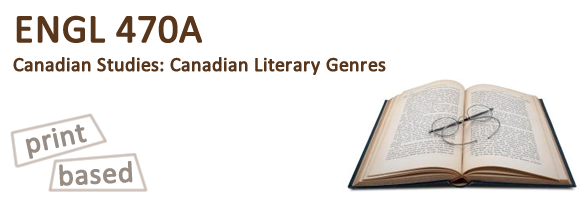
Mode of Delivery
This is a print-based, correspondence course.
Course Outline
- Four assignments
- Final examination
Course Description
This course provides an overview of the range and variety of writing in Canada.
Intended Student and Prerequisites
The audience for this course consists of people with a serious interest in the literature of Canada and a strong desire to understand it more fully and to contribute to it through the critical reading of fiction, poetry, and drama as literary genres. Among the registrants will be students who are University of British Columbia undergraduates (often specializing in English) working towards the Bachelor’s Degree, teachers who, in the process of updating their qualifications, may be discovering their own national literature for the first time, geographically distant students who are unable to attend regular university sessions, and students from other B.C. universities taking the course for transfer credit. Some of you may be returning to the study of literature after an absence of several years, in which case English 470A will accommodate you well.
Course Goals
The first goal is to conduct you through a study of genre in Canadian fiction, poetry, and drama and to give you a sound knowledge of generic classifications and capabilities. The second aim is to encourage you to continue reading Canadian literature, with an eye and an ear to genre.
Course Objectives
Upon completion of English 470A, you will be able:
- to discuss the First Nations origin and European redirection of Canadian literature, and to recognize and to classify the fundamental literary genres of fiction, poetry, and drama (Lesson 1).
- to identify major movements in contemporary Canadian fiction, in particular the work of Atwood and Hodgins, and to evaluate the special properties of the novel and short story as genres
(Lesson 2). - to describe how Canadian poets have adapted European poetic forms and techniques to the Canadian environment and exploited the genre of poetry to experiment in free verse and to design a Canadian poetics (Lesson 3).
- to evaluatehow Canadian dramatists use both traditional and experimental theatrical devices, and, through close readings, to venture backstage and into the audience in Canadian theatre (Lesson 4).
- to demonstrate how in postmodern Canadian literature the genres of fiction, poetry, and drama have been transformed into generic parody, metafiction, and hypermedia (Lesson 5).
Course Format
Each lesson features specific guidelines on undertaking the assigned reading, study, and writing. The course works out to about two or three assigned books for each of the five lessons. You may be required to write on one or more of the books in your assignments.
Course Work and Evaluation
The course work consists of four written assignments, worth a total of 70 marks (or 17.5 marks each) out of the 100 total. Each assignment is a 1,500-2,000 word expository or argumentative essay on the Canadian themes and writers discussed in the lesson. You will be able to exercise considerable choice within the guideliness of each assignment.
A two-hour final examination makes up the remaining 30 marks. It covers the entire course work (both the lessons and the assigned reading), with a special emphasis on genre, and consists of two parts of equal value, one part on fiction, and the other on poetry and/or drama, with each section allowing you considerable choice for essay responses.
Textbooks and Course Materials
Please note you are required to read only two of the four plays listed below by Highway, Lambert, and Pollock.
- Atwood, Margaret. The Handmaid’s Tale. Toronto: McClelland & Stewart-Bantam, 1986.
- Atwood, Margaret, ed. The New Oxford Book of Canadian Verse in English. Toronto: Oxford UP, 1982.
- Brooke, Frances. The History of Emily Montague. Carleton University Press, 1996.
- Coupland, Douglas. Generation X: Tales for an Accelerated Culture. New York: St. Martin’s, 1991.
- Fawcett, Brian. Cambodia: A Book for People Who Find Television Too Slow. Vancouver: Talonbooks, 1986.
- Findley, Timothy. The Wars. Markham: Penguin, 1978.
- Highway, Tomson. The Rez Sisters. Saskatoon: Fifth House, 1988.
- Highway, Tomson. Dry Lips Oughta Move to Kapuskasing. Saskatoon: Fifth House, 1989.
- Hodgins, Jack. The Invention of the World. Agincourt: New American Library, 1977. (now available as CCM)
- Klein, A. M. The Second Scroll. Toronto: McClelland & Stewart, 1994.
- Lambert, Betty. Jenny’s Story and Under the Skin. Toronto: Playwrights Canada, 1987.
- Laurence, Margaret. A Bird in the House. Toronto: McClelland & Stewart, 1970.
- Maillet, Antonine. Pelagie. Trans. Philip Stratford. Toronto: General, 1982.
- Maracle, Lee. Ravensong. Vancouver: Press Gang, 1993. (now available as CCM)
- Pollock, Sharon. Doc. Toronto: Playwrights Canada, 1986.
ENGL 470A Learner Package (includes course manual)
